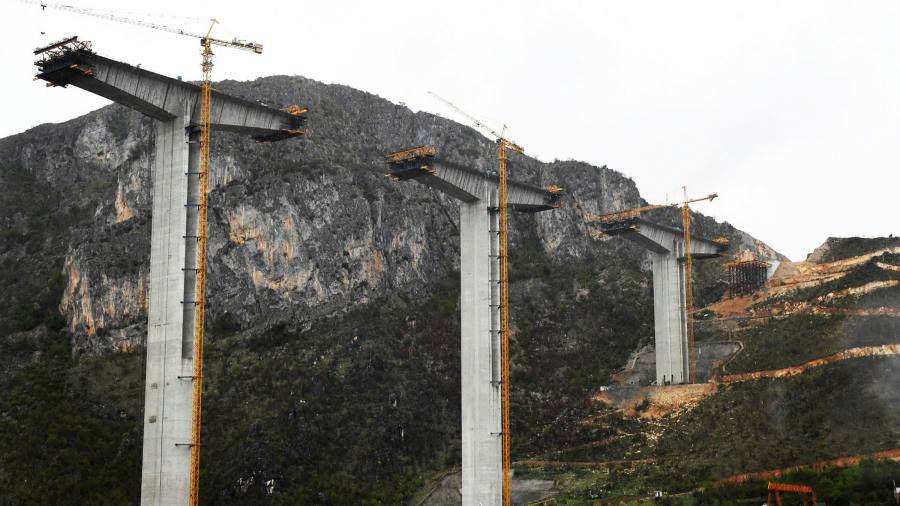[ad_1]
Montenegro has asked the EU for assistance with paying off a $1bn Chinese loan for an incomplete highway project that has imperilled the finances of the small western Balkan nation.
The saga of the incomplete road project, which is being built by the China Road and Bridge Corporation, is part of a larger geopolitical battle for influence on the EU’s periphery. How Brussels responds to Podgorica’s request — and whether it will bail the country out of a project long deemed unviable — will help to shape the bloc’s relationship with the region.
“Montenegro is small enough that it should be an easy decision†for the EU to help refinance the loan, Milojko Spajic, Montenegro’s finance minister, told the Financial Times in an interview. “This is a small but easy win for them. It’s low-hanging fruit,†he added.
Stefan Vladisavljev, foreign policy analyst for the Belgrade Fund for Political Excellence, a think-tank, said: “This is the first time that Montenegro or any other country from the western Balkans has made this type of outreach towards Brussels to combat rising Chinese influence.
“We’ve not heard that someone asked Brussels so openly to combat this together.â€
Montenegro raised eyebrows in 2014 when it signed a deal with China’s ExIm Bank to finance 85 per cent of the cost of a road with a dollar-denominated loan worth almost $1bn. The first 41km section, a quarter of the total length, cost €20m per km, making it one of the most expensive highways per km in the world, said Spajic.
“For infrastructure we’re currently relying on China . . . The situation is dramatic from a geopolitical standpoint,†he said, adding that its important tourism industry relied on visitors from non-EU countries such as Russia. “We have to connect ourselves closer to our EU allies. We need alignment with the economy.â€
Montenegro, which became an independent country when it separated from Serbia in 2006, joined Nato in 2017, despite strong objections from Moscow. Russia has traditionally been a big investor in Montenegro, which hopes to get a green light to join the EU by 2024.Â
Spajic said the government would seek financial help from a range of western organisations, including the European Commission, the European Investment Bank and the European Bank for Reconstruction and Development.Â
The EU has indicated a willingness to help but a commission official said it would be hard to find the proper financial instruments, a task made harder because the project was almost complete.
“Politically we want to help . . . But the size of the loan is disproportionate to the size of the economy, so the mechanics are not obvious yet,†the official said. Montenegro would also need to commit to fiscal reforms, the official added, noting that the highway project did not match EU standards.
Beijing has made steady inroads into the Balkans through infrastructure and energy projects, and more recently its “vaccine diplomacy†drive in the wake of the Covid-19 pandemic. China donated 30,000 doses of the Sinopharm vaccine to Montenegro and sold several million to Serbia.
“China is on the cusp of acquiring real leverage over policy choices, political attitudes, and narratives in some parts of the western Balkans,†the European Council on Foreign Relations said in a report in February.
The contract to build the highway was signed by the previous Montenegro government led by the Democratic Party of Socialists, which was ousted in August after 30 years in power.
Its decision has been scrutinised given that two separate feasibility studies, in 2006 and 2012, concluded that the highway was economically unviable. The government also signed a €54m contract with a Montenegrin-Chinese consortium for a thermal power plant just before it was ejected from office.
China holds one-quarter of Montenegro’s debt, and despite massive delays on the highway’s construction, the first repayment is due in July. If Montenegro were to default, the terms of the contract give China the right to access Montenegrin land as collateral.
A new Montenegrin government, a coalition of forces opposed to DPS with a razor-thin majority, took the reins in December. It faces a host of challenges, including the fact that the tourism-reliant economy collapsed by 15 per cent last year, according to the IMF.
Spajic said Podgorica was in talks with Beijing over another outstanding debt worth €127m.
Observers said Montenegro’s plea was an opportunity for Brussels. “The EU should step in,†said Tena Prelec, a scholar at the University of Oxford who studies the region. “Montenegro is in the EU’s backyard: it would be, finally, a concrete way to show that the EU is indeed a player, a true geostrategic actor.â€Â
[ad_2]
Source link





